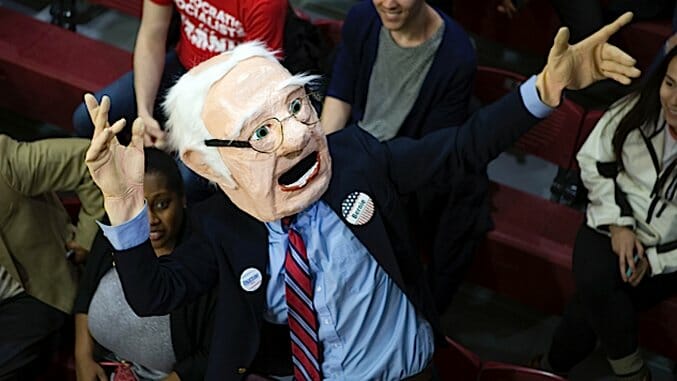Why Bernie Sanders’ Early “Missteps” Represent Everything Wrong With Politics
Photo by Jessica Kourkounis/Getty
At this point in the race, it’s hard to believe that people ever thought that the 2016 Democratic nomination was going to be a simple coronation for Hillary – it’s been much more competitive than anyone could have expected a year ago. But if Bernie Sanders eventually loses the nomination to Hillary Clinton, the likely narrative of his defeat will be that his campaign amounted to “too little, too late.” Although Bernie has been racking up bigger wins in recent contests and amassing more delegates (like he did on Tuesday night in Wisconsin), Clinton still has such a big lead in overall delegates that it will be hard for Sanders to overcome – and Hillary built up most of that lead during the early stages of the race, when Sanders was seemingly caught flatfooted in a few strategically significant areas.
There was a big article in the New York Times the other day about the Sanders campaign re-evaluating its early “missteps” that they wish they could do over. If just a few things had gone differently for the Sanders campaign – in Iowa, Nevada and a few other early-voting states – he might have become the prohibitive favorite for the Democratic nomination today.
The New York Times goes into detail about a few of the strategic decisions that the Sanders campaign made in the early days – even during 2015 – and how they believe those decisions caused the campaign to fall behind in early voting states. This is a must-read article for political junkies and for anyone who wants to understand the strategic nuances of presidential campaigns – but the article also illustrates so many things that are wrong with American politics on the whole.
Here are a few of Sanders’ “missteps” described in the article, and why it’s too bad that these decisions were considered mistakes:
Bernie Kept His Day Job
The article describes how from the first days after announcing his candidacy, Bernie Sanders decided that he would keep showing up for work in the Senate while also campaigning for president, instead of resigning from his Senate seat, like Bob Dole did in 1996, to campaign for president full-time. Unlike Hillary, who left the State Department four years ago and was able to devote her full time and focus to the presidential campaign, Bernie was a part-time presidential candidate.
But isn’t it too bad that this is seen as a strategic mistake? Why is it so crazy to think that a presidential candidate should also have a day job – and actually show up for it? American presidential campaigns have become so all-consuming that the candidates are expected to be on the road 24/7 for a year (or more) before the election, pressing the flesh and raising money. Wouldn’t it be better if the presidential campaign season were an actual “season” instead of “multiple years long?”
Bernie was Reluctant to Attack
In the early days of the campaign, Bernie repeatedly said that he wanted to run a positive campaign that focused on the big issues facing the country, not small-minded personal attacks. As part of this strategy, he was reluctant to personally attack Hillary Clinton for issues like the $675,000 she made from giving speeches to Goldman Sachs, or her usage of private email as Secretary of State (a memorable moment from a debate last fall had Bernie telling Hillary, supportively, that the American people are sick of hearing about the “damn emails.”) As is so often the case with “outsider” insurgent candidates, Bernie talked about wanting to run a different kind of campaign that would elevate the public discourse.
The problem is, politics ain’t beanbag. The negative attack ads that so many voters claim to hate and vow to ignore actually work really well. It’s likely that Bernie’s campaign would be in much better position today if he had gone negative and criticized Hillary more aggressively during the early days of the campaign. This strategy would not have been as high-minded, but it probably would have won him more delegates.
And isn’t that too bad? It seems like every time a candidate comes along who actually tries to play nice and do the right thing and raise the tone of debate in American politics, they end up getting dragged down into the muck like all the others.
-

-

-

-

-

-

-

-

-

-

-

-

-

-

-

-

-

-

-

-

-

-

-

-

-

-

-

-

-

-

-

-

-

-

-

-

-

-

-

-








































